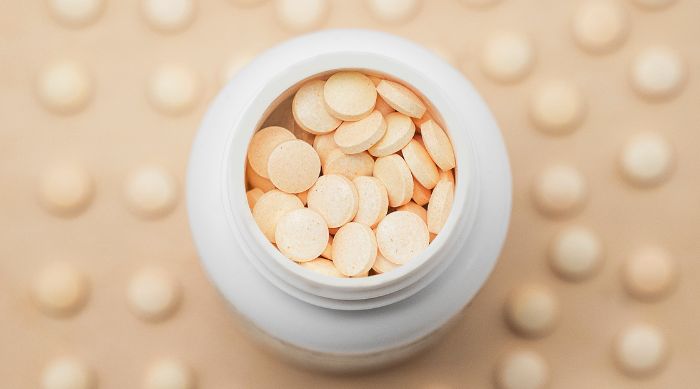Joint pain and chronic pain from arthritis is a common condition that affects millions of people each year. While many turn to medication management as their first response, joint health supplements may help reduce joint inflammation and joint pain long-term.
You should always talk to your primary care physician before adding supplements, especially if you are taking medications for other conditions. From there, you have quite a few options for joint supplements that support long-term pain relief.
1. Glucosamine
Glucosamine is a natural compound found in your body’s cartilage — connective tissues that protect your joints from damage. In conditions like osteoarthritis where cartilage has deteriorated, glucosamine supplements may reduce the resulting pain.
Glucosamine supplements come in 2 main formulas: glucosamine hydrochloride and glucosamine sulfate. Both are used in the treatment of different forms of arthritis, but research is ongoing as to which is more easily absorbed.
Glucosamine sulfate is more common and typically comes in capsule form of at least 500 mg. Recommended use is up to 3 capsules daily. Many brands offer the supplement as glucosamine chondroitin, a common combination treatment for patients with osteoarthritis.
2. Chondroitin
Condroitin is another major component of cartilage. Chondroitin supplements may help strengthen tissues weakened by different forms of arthritis.
This over-the-counter joint support supplement is typically found in 600 mg capsules. Most brands recommend up to 3 capsules daily for long-term joint support. Studies shows that chondroitin may be more effective when paired with glucosamine.
3. Fish Oil
If you don’t love the idea of adding more seafood to your diet, fish oil is a good compromise. Fish oil supplements act as anti-inflammatories that may return joint mobility in patients with arthritis symptoms and reduce arthritic pain.
Fish oil may come as a liquid or gummy, but is most common in capsule form. Most brands recommend 2 capsules daily of up to 1,000 mg per dose.
What should I be eating to help my joints? You can support your joint health by eating an anti-inflammatory diet. That includes leafy greens, beans and lentils, and fatty fish and shellfish rich in omega-3 fatty acids.
4. Turmeric
Turmeric is a well-known superfood and antioxidant that supports joints thanks to its anti-inflammatory effects. It’s an easy spice to incorporate into your meals, although some recommend pairing it with healthy fats or black pepper to make it easier for the body to absorb.
Turmeric supplements may include turmeric or curcumin, its active ingredient. Most brands recommend one capsule daily of at least 500 mg to boost overall joint health.
5. Curcumin
Curcumin, an anti-inflammatory, is the active ingredient in turmeric. While turmeric may be easier for the body to absorb, most curcumin supplements include additives like black pepper to support better absorption.
Pure curcumin comes in 500-1,000 mg, with a recommended daily dose of up to 1,500 mg.
6. SAMe
SAM-e, or or S-adenosyl-methionine, is a naturally-occuring compound produced in the liver that supports healthy joint and tissue function. As a supplement, it shows promise in cartilage repair, particularly in patients with knee pain from knee osteoarthritis.
Some patients with chronic pain report fewer side effects with SAMe supplements compared to non-steroidal anti-inflammatory drugs (NSAIDs) like ibuprofen or aspirin. The recommended dose to start is one 400-mg tablet daily. Some patients may see health benefits from a higher dose.
7. Methylsulfonylmethane (MSM)
Methylsulfonylmethane (MSM) is a chemical that supports a variety of processes in the body, including collagen production. It’s also an anti-inflammatory that may provide short-term pain relief and improved joint function in patients with conditions like osteoarthritis.
Capsules or powdered supplements typically contain 1,000 mg of MSM per serving to be taken up to 3 times daily.
8. Boswellia
Boswellia is an herbal extract also known as Indian frankincense. It has a long history of use as an anti-inflammatory in Asian and African countries. When used for joint inflammation, it shows promise in reducing joint pain and stiffness.
Recommended dose amounts vary quite a bit, but most capsules start at 100-250 mg to be taken 2-3 times daily.
9. Vitamin C
Healthy levels of the antioxidant vitamin C fight back against chronic inflammation, a known factor in joint pain. Vitamin C also boosts your body’s autoimmune response, which could mean improved outcomes in rheumatoid arthritis patients.
The U.S. Food and Drug Administration (FDA) recommends 90 mg of vitamin C per day for men and 75 mg for women. Vitamin C supplements in gummy or capsule form typically start around 150% of your daily allowance to boost immune health.
10. Vitamin D
Vitamin D (specifically vitamin D3) is important to bone density and calcium absorption. Strong bones are important to joint health. A vitamin D supplement can support deficiencies from a lack of the vitamin in your diet, especially for those who don’t see much sun throughout the year.
Studies show 2,000 IU (equivalent to 50 mcg) of vitamin D daily may improve symptoms of chronic pain in joint patients. Supplements typically come in gummy or capsule form.
11. Devil’s Claw
Devil’s claw is an herb widely used as an anti-inflammatory and natural pain reliever since the 1900s, although its history goes back further if you look at traditional uses throughout Africa.
Limited studies show it may be safer than NSAIDs for osteoarthritis, joint stiffness, and low back and neck pain. Find it in powder, tincture, liquor, and capsule form starting at 500 mg to be taken up to 3 times daily.
12. Avocado Soybean Unsaponifiables (ASUs)
Avocado soy unsaponifiables (ASUs) are avocado and soybean oil extracts often used by women with menopause symptoms for anti-inflammatory effects. In adults with joint pain, they show promise in reducing joint inflammation. Capsules come in 300 mg to be taken up to twice daily.
13. Cherry Juice Extract
Cherry juice is an anti-inflammatory that shows promise as an effective pain reliever for those with mild to moderate osteoarthritis. It’s also frequently recommended for patients looking to reduce attacks of gout, a painful form of arthritis caused by excess uric acid in the joints.
Cherries in general are a powerful antioxidant that reduce oxidative stress, a known factor in joint pain. When taken as an extract, the Arthritis Foundation suggests at least one tablespoon twice a day to manage symptoms of gout.
14. Collagen
Collagen is a key component of cartilage growth and repair. As we age, our body makes less of these proteins, which can lead to wear-and-tear forms of arthritis in older adults or athletes.
Supplements are typically used to support skin elasticity, but may also support joint function. Note that research is limited about collagen as a joint pain support. If you’d like to try it, look for type 2 collagen supplements that target joint stress.
Formulas vary widely for collagen supplements, but you’ll typically find them in capsule or powder form to be taken daily.
15. Magnesium
Magnesium supports healthy bones and strong cartilage. A deficiency can cause muscle cramps and fatigue, an increased risk of osteoporosis, even low testosterone in men. Men over 30 should get at least 420 mg of magnesium daily. Women should target 320 mg.
Supplements typically cover 120-150% of that recommended dose in capsules taken daily. You may also find it as part of a multivitamin for overall bone and joint health.
16. Borage Oil
Borage oil is a plant extract high in anti-inflammatory fatty acids. Some studies show it may reduce joint pain from rheumatoid arthritis and reduce the need for conventional pain medications. Capsules average 1,200 mg of borage oil to be taken up to twice daily.
What is the best natural supplement for joint health? The best natural supplement for joint health is a supplement that includes omega 3 fatty acids, glucosamine and chondroitin, or vitamins and minerals proven to support the joints.
What else can you do for joint health?
Dietary supplements can be a powerful tool in giving you relief from chronic pain, but they aren’t a cure-all. For healthy joints long-term, consider lifestyle changes to reduce joint inflammation and even lubricate your joints naturally:
- Maintain a healthy weight.
- Get regular exercise.
- Manage your stress.
- Get good rest.
- Eat a diet rich in anti-inflammatories.
What foods are good for your joints? Anti-inflammatory foods like seeds and nuts, fresh fruits and vegetables, and fatty fish are all good for your joints.
You should also seek out joint-specific healthcare as you need it. At Sano Health Club, we work with patients who haven’t found long-term solutions for their chronic joint pain. If you’re ready to learn about a fresh, integrative approach, schedule a discovery call.
Sources
- Fox, B. A. & Stephens M. M. (2007). Glucosamine hydrochloride for the treatment of osteoarthritis symptoms. Clinical Interventions in Aging, 2(4), 599-604.
- Simental-Mendía, M., Sánchez-García, A., Vilchez-Cavazos, F., et al. (2018). Effect of glucosamine and chondroitin sulfate in symptomatic knee osteoarthritis: a systematic review and meta-analysis of randomized placebo-controlled trials. Rheumatology International, 38(8), 1413-1428.
- Maroon, J. C. & Bost, J. W. (2006). Omega-3 fatty acids (fish oil) as an anti-inflammatory: an alternative to nonsteroidal anti-inflammatory drugs for discogenic pain. Surgical Neurology International, 65(4), 326-331.
- Daily, J. W., Yang, M., & Park, S. (2016). Efficacy of turmeric extracts and curcumin for alleviating the symptoms of joint arthritis: a systematic review and meta-analysis of randomized clinical trials. Journal of Medicinal Food, 9(8), 717-729.
- Najm, W. I., Reinsch, S., Hoehler, F., et al. (2004). S-adenosyl methionine (SAMe) versus celecoxib for the treatment of osteoarthritis symptoms: a double-blind cross-over trial. BMC Musculoskelet Disorders, 5, 6.
- Soeken, K. L., Lee, W. L., Bausell, R. B., et al. (2002). Safety and efficacy of S-adenosylmethionine (SAMe) for osteoarthritis. The Journal of Family Practice Issues, 51(5), 425-430.
- Kim, L. S., Axelrod, L. J., Howard, P., et al. (2006). Efficacy of methylsulfonylmethane (MSM) in osteoarthritis pain of the knee: a pilot clinical trial. Osteoarthritis Cartilage, 14(3), 286-294.
- Yu, G., Xiang, W., Zhang, T., et al. (2020). Effectiveness of boswellia and boswellia extract for osteoarthritis patients: a systematic review and meta-analysis. BMC Complementary Medicine and Therapies, 20(1), 225.
- Jalili, M., Kolahi, S., Aref-Hosseini, S. R., et al. (2014). Beneficial role of antioxidants on clinical outcomes and erythrocyte antioxidant parameters in rheumatoid arthritis patients. International Journal of Preventative Medicine, 5(7), 835-840.
- Kragstrup, T. W. (2011). Vitamin D supplementation for patients with chronic pain. Scandinavian Journal of Primary Health Care, 29(1), 4-5.
- Brien, S., Lewith, G. T., & McGregor, G. Devil’s claw (Harpagophytum procumbens) as a treatment for osteoarthritis: a review of efficacy and safety. Journal of Alternative and Complementary Medicine, 12(10), 981-993.
- Salehi, B., Rescigno, A., Dettori, T., et al. (2020). Avocado-soybean unsaponifiables: a panoply of potentialities to be exploited. Biomolecules, 10(1), 130.
- Chai, S. C., Davis, K., Zhang, Z., et al. (2019). Effects of tart cherry juice on biomarkers of inflammation and oxidative stress in older adults. Nutrients, 11(2), 228.
- Chen, P. E., Liu, C. Y., Chien, W. H., et al. (2019). Effectiveness of cherries in reducing uric acid and gout: a systematic review. Evidence-Based Complementary and Alternative Medicine, eCollection 2019.
- Clark, K.L., Sebastianelli, W., Flechsenhar, K.R., et al. (2008). 24-Week study on the use of collagen hydrolysate as a dietary supplement in athletes with activity-related joint pain. Current Medical Research and Opinion, 24(5), 1485-1496.
- Shmagel, A., Onizuka, N., Langsetmo, L., et al. (2081). Low magnesium intake is associated with increased knee pain in subjects with radiographic knee osteoarthritis: data from the Osteoarthritis Initiative. Osteoarthritis Cartilage, 26(5), 651-658.
- Reed, G. W., Leung, K., Rossetti, R. G., et al. (2014). Treatment of rheumatoid arthritis with marine and botanical oils: an 18-month, randomized, and double-blind trial. Evidence-Based Complementary and Alternative Medicine, 2014.


